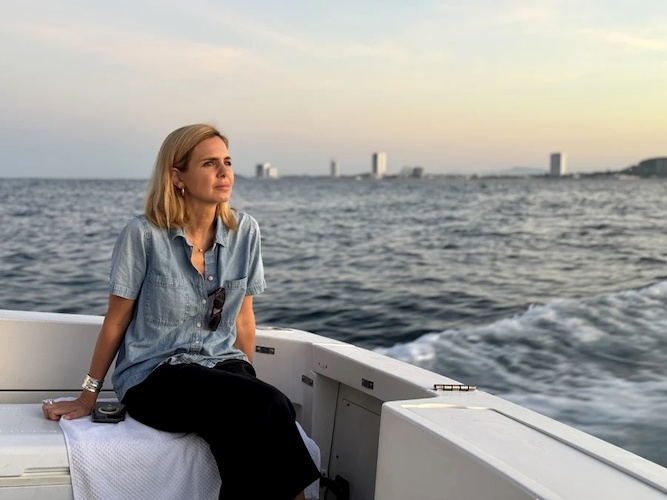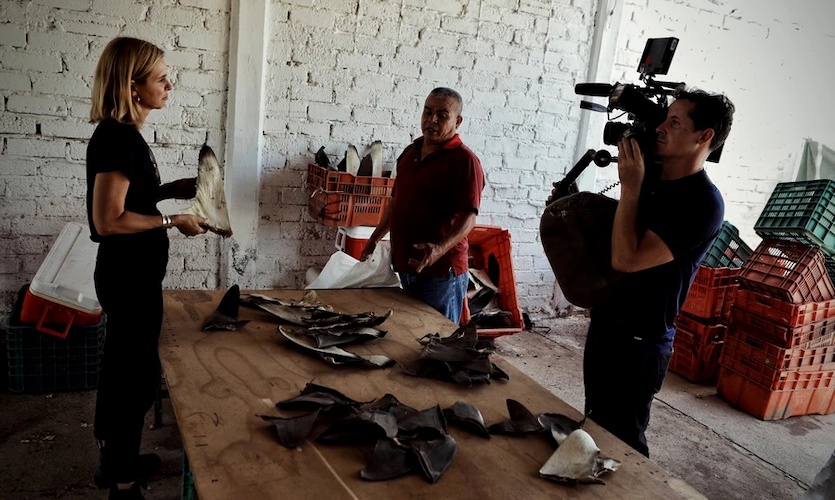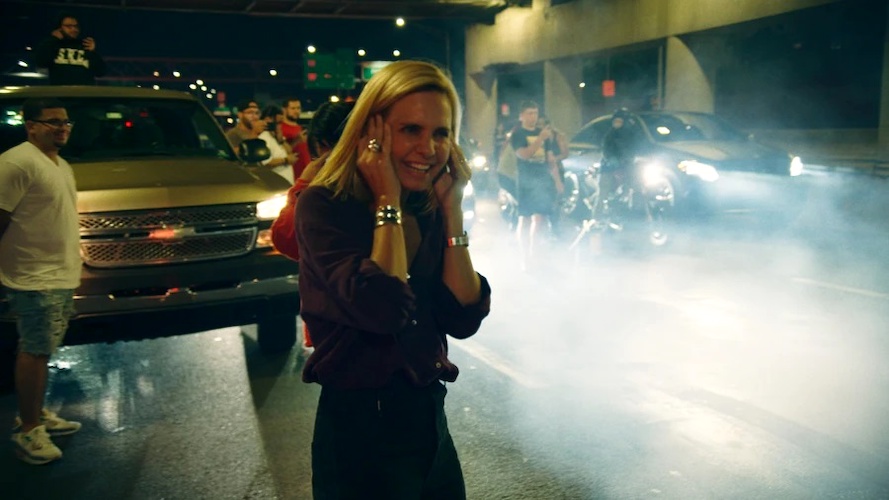Interview: Mariana van Zeller's Fearless Journey Continues in Season 5 of "Trafficked"
This week, the fifth season of the highly acclaimed series Trafficked with Mariana van Zeller kicks off on National Geographic (with episodes streaming the next day on Hulu and Hulu on Disney+). Recently, Benji had a chance to chat with Van Zeller herself and get more insight into the making of this unique and eye-opening series.
Benji Breitbart: First of all, congratulations on having more Emmys than anyone else in the world, I know. Well-deserved, obviously.
Mariana Van Zeller: Thank you. It was a great night. It was a fun time.
BB: Do you have enough space to put all of them?
MVZ: We joke that we're growing an Emmy tree. You know, you go into Netflix and they have an Emmy tree where they place all their Emmys. We're trying to compete with that.
BB: One of the things that your show has made me realize is that there's a lot more being trafficked than I had thought. How have you done so much of the show?
MVZ: Absolutely. You know, Ben, you're not the only one. When I started, the amount of people that said, “Okay, you've had one season, you know, it's a terrible show idea because how many more seasons can you have? I mean, how many more black markets are there out there?" And here we are, season five, and I still have a long list of markets to investigate.
BB: I will say that I don't know how you do it because I get anxiety just watching you in these situations. In the first episode where you're interviewing the cartels and they're concerned about the Marines coming and you literally see the gun on the scene and he puts it and you're being rushed away. What makes you so fearless?
MVZ: I'm not sure if it's fearless. I think it's more, I'm incredibly curious and I've always been fascinated by these underworlds. You know, you tell a journalist in general that the only place they can go is behind that door. Well, that's exactly where the journalist wants to go, right? And for me, it's always been that way. I've always wanted to know the things and go to the places that nobody else is allowed to go.
And particularly when we talk about black markets, knowing that it's almost 38% of the global economy are these black and gray markets, it's what economists call the hidden third. And knowing that they have just such a deep impact on our daily lives, whether we're talking about immigration or guns or the cartel presence or human trafficking. All these issues or, you know, animals going, endangered animals, all wildlife trafficking, all these issues actually have a deep impact on our daily lives, whether we acknowledge it or not.
I mean, the drug war alone has changed governments in the United States, even in the amount of taxes that we don't receive, because they're being funneled into these black markets. And that affects our schools and our transportation and our governments in general.
There are magazines and organizations out there studying every single up and down of the legal economy. And there is very little out there, very few people out there investigating this illegal economy. So for me, again, it's curiosity. I do think I was born without the fear gene when it comes to talking to people. That doesn't mean that, when I'm face to face with a shark, which I was in one of the episodes, I was terrified before diving — give me a predator or an animal predator, and I will die. But you give me a guy with a gun and an AK-47 and I somehow think that I'm going to be able to rationalize with him. And I'm just deeply motivated by my own curiosity of finding out why this person ended up here.
BB: One of the things that I find interesting, as we've gone through the show over the last five seasons is, at first, you feel this is unbelievable because there's not much reporting on it. And you're like, “Why am I only hearing about it through this show?" But you're exposing something that is important to know about. Why do you think that this is so underreported?
MVZ: I think the kind of journalism that we do with Trafficked is hard. It's really challenging. It's expensive. It's risky. There aren't a lot, unfortunately, there aren't a lot of news organizations or organizations of any type that are willing to fund this type of reporting.
I think it's an unpredictable world, the underworld, even no matter how much planning is put in place, no matter how many hostile environment training we do as a team, and no matter how much experience I have reporting on these underworlds, it's impossible to, it's unpredictable, and it's risky.
And a lot of people don't want to be associated with that, which is a huge disservice, I think, because one of the things that I find, I'm not trying to just showcase, look, it's a dangerous world out there, we should all be very afraid. That's not the message of Trafficked. If you watch episode after episode, you realize that actually the message of Trafficked is that it is an unequal world. There's enormous inequality and disparity of income. And people, when you have half of the world living on less than $7 a day, when you have 10% of the world, that's over 700 and something million people that live under the poverty line, these are people who can't afford to put bread on their table for their families. When this happens, disparity, inequality leads to violence, it leads to the growth of these black markets.
And so as long as we can't figure out how to solve that, we're not going to, we're not going to live in a peaceful world. Violence is going to increase, these black markets are going to increase as well.
BB: One of the things that I find interesting is that it really does give you insight into the traffickers, and not that what they do is okay, I'm not going to condone it, but at least you can understand it a little bit.
MVZ: Absolutely. It's not about condoning for me. I think sometimes there's an idea that as journalists, your job is to confront people, right? It is about accountability, obviously, but it's mainly about accountability when you're interviewing people in power. When you're interviewing 16 year old kids in Peru who carry cocaine because they want to go to college and their parents can't afford it, and they want a better life for themselves and their families in the future, those are not the people that you're holding accountable. You're holding accountable the governments that allow this kind of poverty to exist in their countries.
So there's a part of, I see myself as a journalist, that my job is actually to try to connect with these people, to try to understand why they became drug traffickers or human smugglers or scammers. It doesn't mean that I condone what they do, but I think understanding how they got there is way more important because at the end of the day, I don't think people are born wanting to be criminals. I think it is the conditions, it's the lack of opportunities that leads to a life of crime. And so understanding why that is and what we can do to make sure that that doesn't happen in the future, that's the best thing we can do and the only thing we can do.
BB: One of the things that I love about the show is that you show the difficulty in getting access at times. But oftentimes you do get access to people who, at least in my perspective, have nothing to gain by giving you access, right? They're doing very illegal things, why would you want any spotlight on that? Why do you think people do open up to you?
MVZ: Yeah, I think three main reasons, and I talk about these often because I think it's the biggest mystery surrounding Trafficked. Like, you know, there's some people think it's a fake show that there's no way that people are actually talking to us.
What those people, most people don't know is the work that goes behind actually gaining access. It's months, sometimes even years. I mean, there literally have been subjects and episodes we have done that have taken us years to convince people to talk to us.
And I think at the end of the day, the three main reasons people agree to talk to us are, it's ego. People want to show off, they want to talk about how good they are at what they do, how powerful their cartels, their gangs, their operations are. Sometimes their families don't even know what they do, and we give them an opportunity with a mask and a distorted voice to sort of brag, right?
Secondly, I think it's impunity in a lot of the places where we report in such as Sinaloa, Mexico, there's enormous police corruption. They don't think they're going to get in trouble. Oftentimes they don't. And so they don't see a downside to speaking to National Geographic, an internationally well-recognized brand. And to me, it's become sort of easier to convince people because people have now watched the show, and they sort of feel that they can trust me and my team.
And then the third most important reason is just wanting to be understood. These are the most shunned and stereotyped people in society, right? They're considered the bad guys. I approach them and I tell them, “Look, I'm not here to judge you. Again, I do not condone what you do." And I ask them hard questions. If you watch the show, you'll know that. But I'm here to try to understand why you do what you do. And I think that goes a long, long way.
I remember an interview we did for season four of Trafficked, which was about assassins, which is almost impossible to sort of find a connection with an assassin or feel any empathy for somebody that's doing the worst of the worst crimes, right? But even in that case, I will never forget interviewing a South African assassin. And at the end of the interview, he almost was in tears and telling me that, you know, after a two-hour conversation, that so much, he'd been doing this violent crime for years. He'd been orphaned, horrible conditions, life conditions, and he had never processed all the things that he was doing and the suffering that he was giving other people. And here was an opportunity to sort of look back at his life and talk about everything and put it all into perspective. And he was, you know, he told me it was for him, it was life-changing.
So I think, yeah, wanting to be understood is, I think, one of the biggest reasons why people talk to us, quite frankly.
BB: You mentioned the amount of time it takes to put on the show. And while I do presume you have a lean team, there's a lot of resources that went into making the show. I imagine many entertainment companies or news organizations would not be as patient as it seems like Nat Geo has been. What role have they played in terms of the support they've given in order to allow you to do this incredible work?
MVZ: I mean, you look around and there's not one single other show out there doing this type of investigative journalism. It's like you said, it's expensive. It's very expensive. It's risky. It takes time. It's every single reason why a person, why anyone, why people in power shouldn't be doing this. You know, I can give you 10 reasons why my boss at Nat Geo could have said “no" to this show. Instead here we are in season five.
We've always had an incredible support of National Geographic, even after we got stuck in the coup in Niger. It was a really difficult time for myself on the ground, my team on the ground, but also for the people, you know, our team in Los Angeles, but also for the people at National Geographic and at Disney at large, you know, knowing that they had a team stuck in a country with an impending war, not knowing if they were going to be able to leave safely, to come home safely. That is an enormous responsibility to have. And yet, you know, I'd say a month and a half later, I was on the ground again, reporting actually was for the first episode that we shot for season five. So that just shows you sort of the commitment that they have for important investigative journalism.
BB: Have you heard from Delta yet as being the official airline of the drug cartels, according to one interviewee?
MVZ: It's all these little details that, you know, I find so fascinating. No matter how many years we report on drug trafficking, you always find new things. And that one just totally, it was so interesting when he said, yeah, first of all, that the majority of the drugs that this guy who's American, by the way, he works for the cartel or with the cartel, but he's actually an American citizen, doesn't speak a word of Spanish, has never lived in Mexico or any Latin American country. And yet here he is moving kilos and hundreds of thousands or millions of dollars of drugs for the cartel every year. And when I asked him how he transported that, I was imagining, I don't know, vans, trucks, discreet ways, small cars. No, in fact, he's commercial airlines and using mostly women, oftentimes strippers to move the product from city to city. And he told me, yeah, that his preferred airline was Delta because they have a great fare for extra baggage, which was mind boggling.
I was thinking of reaching out to Delta and asking if they wanted to sponsor the show.
BB: I was on a plane while I'm watching this and I was like, “I don't know that I'm ever going to be able to board a commercial flight and not look around and wonder…"
MVZ: And that's what El Gringo, the guy that we interviewed, said that almost every single flight that leaves the West Coast is guaranteed, going towards the East Coast or middle America, it's guaranteed that there is drugs on it.
BB: Yeah. I can't tell you how many Delta flights from the West Coast to the East Coast I've taken. And I've never been transporting drugs, but now I look back.
MVZ: But they were close to you.
BB: Well, the show is so amazing. I'll be honest, when I first heard about it, I was thinking, “Do I really want to watch a show about trafficking before you go to bed?" But one of the perks of this job is you get to watch shows you would never watch just sort of on your own. Now, I've watched every single episode of all five seasons and it never gets old. You find new and exciting things. I mean, I still don't recommend watching it before bed because it gets you thinking, but definitely watch it. I really appreciate the time. And I really appreciate the work you do and the effort you put into educating the world about these issues.
MVZ: Oh, I so appreciate it, Ben. Really, really, really appreciate that you watch everything. I'm so happy. Thank you for watching.
BB: I can't wait for season six.
MVZ: We don't have it yet. We'll have to keep writing articles about it because we don't have season six.
BB: We'll keep pushing for it. I mean, you need a few more Emmys to flesh out your Emmy forest you're going to build.
MVZ: That's right. Thank you, Ben. I really appreciate it.
Season 5 of Trafficked with Mariana van Zeller debuted on National Geographic on July 19th, with episodes streaming the next day on Hulu and Hulu on Disney+.





